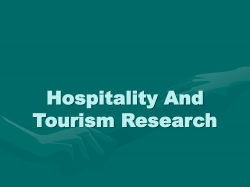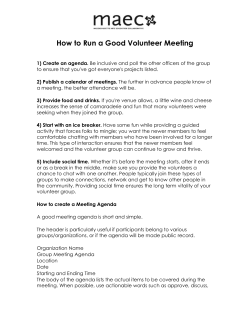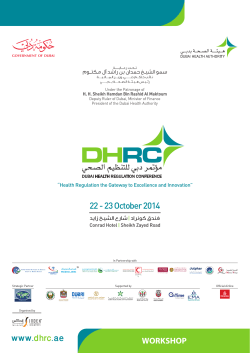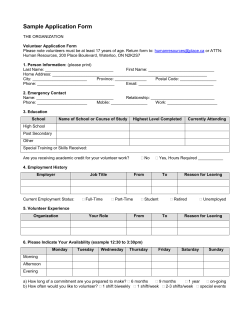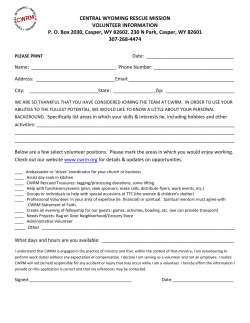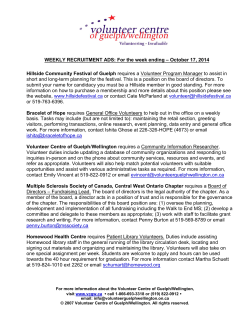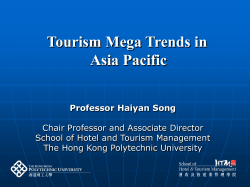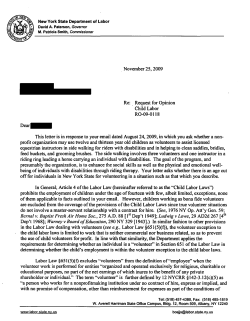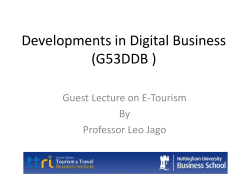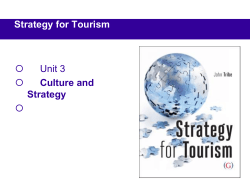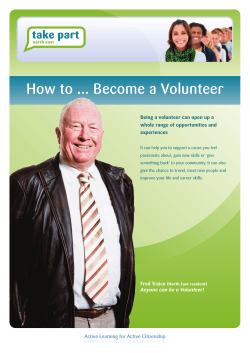
V T , E I
VOLUNTEER TOURISM, ECONOMIC IMPACTS & HOST COMMUNITIES: CAN WE DO BETTER? Kristin M. Lamoureux, Ph.D. The George Washington University International Institute of Tourism Studies klam@gwu.edu GENERAL STATISTICS Tourism Overall • International Tourism Receipts - $909billion in 2010 (UNWTO, 2011) Adventure Tourism (including Volunteer Tourism) • Value of global adventure market - $89billion (ATTA, 2010) VOLUNTEER STATISTICS •Global volunteering – increasing •US Volunteers in general = $169M in 2009 (Independent Sector, 2011) •US Volunteers Abroad = $2.92billion in 2005 (Lough, McBride & Sherradan, 2007) •US National Parks: Mt. Rainer NP – Volunteers contributed $1.36M in 2007-08 to NPS’ operations in Mt. Rainer (Holmes & Smith) VOLUNTEER TOURISM NEEDS Volunteer Tourism Differ… • Clarity – volunteer tourists want to see where their money is going and how it is really helping the community (Michel & Mille, 2010) • Interaction – want a closer, more meaningful interaction with host communities (ATTA, 2010) WHY IS THIS TYPE OF TOURISM ATTRACTIVE TO A DESTINATION? • Represents a potentially important market segment for emerging destinations • Visitors contribute directly to the destination • Generally do not need well developed infrastructure • Pay for their experience • Beyond their work/research, also spend time traveling • Provide very valuable word-of-mouth exposure • Use on-line social networks extensively • Skilled volunteers or non-volunteers provide services not available (ex. Doctors, architects, scientists) TOURISM IMPACTS – ON THE GROUND Research on spending – scarce •Volunteer Tourists may “spend less money than other tourists and have a smaller impact” Gray & Campbell, 2007 WHAT IS ECONOMIC IMPACT TO DESTINATIONS? •Not easy to quantify •Who is “the community”? •Equal distribution versus select partnerships •Can we really “involve” them? •Few good examples - HFH EX. HABITAT FOR HUMANITY Habitat for Humanity’s Economic Impact in South Dakota • 2009 – HFH built 326 homes in South Dakota. • Homes valued at $35 million. • Habitat affiliates purchased over $23M in goods & services to complete the construction of these homes. • Direct Impact to SD economy over $150.8 million. • Volunteer investment in local communities per year is over $1.6K. • HFH Homeowners paid over $466,000 in property taxes. http://habitatsouthdakota.org/about_us/news.php?ID=37 TOURISM DEVELOPMENT Developing Countries: small businesses in most developing nations have a number of constraints which keep them from being able to fully access lucrative domestic and international tourism markets. Supported tourism can assist. Tourism Arrivals/Spending • Opportunities for economic growth • Cultural Exchange • Investment Small Business Development • Lack access to tourism markets • Need training/capacity building DESTINATION MODELS •Egypt – Friends of Volunteer Tourism Egypt •Honduras – SAVE Center • Bulgaria – SAVE Travel Center in Smolyan •Uganda – Volunteer Support Network EGYPT Friends of Volunteer Tourism Egypt Local partnership •Inbound tour operators & Non-governmental organizations •Build capacity •Joint marketing and support •Product Development PHASING OF STRATEGY Partnership between the Stakeholders • Identify Opportunities Assessment Capacity Building • Standards • Skill development • Product enhancement Product Development Marketing • Outreach to markets SAVE TOURISM Scientific Academic Volunteer Educational • Researchers & volunteers participating in field studies • Students/teacher s undertaking travel for academic credit • Growing market of “Voluntourism” • Travelers desiring a hands-on experiential learning experience SAVE Alliance Activities Dominican Republic: Puerto Plata portal, community tourism enterprise development & visitor center design Northern Morocco: Tourism product development &SAVE market in rural communities Montenegro: : Sustainable tourism development : Durmitor World Heritage Site. Bulgaria: SAVE Center in collaboration with municipality In Rodolpe Mtns LAO PDR: Protected area research & training center Guatemala: Marketing & communication strategy for Lake Atlican Panama: Rapid Assessment & market analysis of the sustainable tourism potential for Soberinia National Park and Panama City. Northern Mozambique: Trip circuits & management information system. Indonesia: Volunteer-based skills transfer program Southern Africa: African slave wrecks & heritage route development Honduras: SAVE strategy and product development Ethiopia: community capacity building & small business development SAVE MODEL Preliminary identification of potential destinations and assessment of their assets, needs, level of readiness Education, capacity building and specialized training targeting specific stakeholders as well as the local community –Volunteer Sending Organizations (VSOs) Identification of appropriate intermediaries and organization of familiarization trips and assessment activities—Volunteer Receiving Organizations (VROs) Establishment of a SAVE Network & Center to coordinate all SAVE travel-related activities at selected destinations. SAVE TRAVEL CENTER - BULGARIA The vision for the SAVE Center is that it will be a leading force for the economic growth of the region through sustainable travel, a contributor to the diversification of the country’s travel portfolio and image, and a model for SAVE centers around the world. SAVE CENTER - BULGARIA Purpose 1. To facilitate the development of SAVE travel products based on current and potential assets 2. To serve as a local cultural and crafts center 3. To service SAVE market groups and facilitate the Packaging of relevant products SAVE PRODUCT DEVELOPMENT Volunteer Receiving Organizations S A V E Volunteer Sending Organizations UGANDA– BEST PRACTICES Volunteer Support Network Local office & staff • Local leadership, knowledge, and expertise is vital. • Easily accessible and available for volunteers. Small scale • Partner with small number of thoroughly vetted projects to ensure quality. • Volunteer-receiving organizations have clearly demonstrated need. Positive reputation • Organization’s directors and staff have ties with respected NGO’s. • Directors are also recognized by the national government. Uganda CONCLUSION & FUTURE POSSIBILITIES Academic Research Needed Alternative Models? QUESTIONS???
© Copyright 2025
